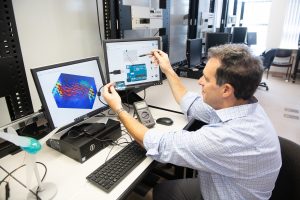Pandemic “Fast-forwarded” Online Learning at NECC

Engineering Professor Doug Leaffer transitioned two engineering courses to online delivery during the pandemic.
Haverhill and Lawrence, MA (Aug. 5, 2021)-If there’s a silver lining to the COVID pandemic, it might be that online programs and support services at colleges are now stronger than ever. And that’s certainly the case at Northern Essex Community College.
Since the spring of 2020, the college’s Center for Instructional Technology (CIT) has helped faculty transition 300 courses to online delivery. During the same time frame, the Student and Academic Affairs teams have adapted all student services for remote delivery, including tutoring, academic and career advising, financial aid, registration, and student activities.
In the fall, when faculty, staff, and students return to campus, they will discover more flexibility as the result of enhanced online options.
“We’ve taken a misfortune and turned it into an opportunity,” says Melba Acevedo, director of CIT. “The pandemic has fast-forwarded online learning at NECC by decades.”
New Accelerated Online Degree Programs
While the college offered 11 programs that were 80% online pre-COVID, they primarily followed the traditional 15-week semester.
New this fall are three fully online programs in Business Transfer, Criminal Justice, and General Studies: Health Specialization, which feature accelerated 7 or 8 week courses, providing opportunities to earn a degree quickly, even if working full-time.
In one semester, students can take four courses; two the first part of the semester and two the second part. By taking four courses each semester, along with courses during the summer and winter intersession, students can graduate in two years.
“These programs are geared toward adults who are working but want a degree to get ahead,” says Kelly Sullivan, the college’s dean of business and professional studies. “Taking just two courses at a time will allow students to focus.”
The cost to earn one of these online associate degrees is approximately $9,000 and whenever possible professors are using open educational resources, which are free to students, rather than expensive textbooks.
More Online Course Options
Before the pandemic, some areas of the college, such as science and engineering, were reluctant to explore online delivery because faculty didn’t believe an online experience would be comparable to face-to-face delivery, especially in courses with a lab component.
Engineering Professor Doug Leaffer admits that he was skeptical at first. “”Initially, I viewed online engineering course delivery as challenging. I wasn’t convinced that students could make the transition from “benchtop” learning in one of our instructor-led engineering labs to “desktop” learning on their own computer,” he says.
After taking CIT’s six-week online training module, “iTeach”, during the summer of 2020, Leaffer transitioned two engineering courses—Engineering Physics 1 and Strength of Materials—to online delivery. With COVID restrictions lifted, he will continue to offer the latter online, while the former will return to face-to-face because he thinks the lab component “is ideally taught ‘on the bench’, with students teams conducting experiments, collecting data.”
With what he’s learned about teaching online, he’s also adding a new hybrid course this fall, Engineering Essentials & Design. If that’s successful, he may continue with the hybrid option.
“We are working with faculty like Doug whom we never had the opportunity to work with,” says Acevedo. “They didn’t see themselves teaching online, but having gone through this, they are taking the next step. They don’t want to let go of what they learned, and are creating hybrid courses.”
Students are More Open to Online Learning
Like the faculty, some students are also discovering that they can be successful in online classes.
Taisha Madero, a Human Services major and the mother of three children, ages 7, 9, and 13, had taken online summer classes before COVID but she much preferred face-to-face courses.
“I wasn’t crazy about online courses but it grew on me during the pandemic,” she says.
With a full-time job as an intake assistant for Community Action of Haverhill (MA) and her three children at home studying remotely, she appreciated the flexibility.
She found it helpful when her professors shared videos and PowerPoint lectures, and appreciated occasional Zoom meetings with the professor and class.
She will be taking her last two classes this fall, both online, and will earn her associate degree in December.
What’s Next
Prior to the pandemic, close to one third of students took at least one online course, usually combined with a schedule that included face-to-face courses. It was a way for Northern Essex’s busy students—a third of whom are working full-time—to maximize their course load.
During the fall 2020 semester and the spring 2021 semester, 90% of courses were taught online, and, in the fall of 2021, 25% will be taught online. As COVID restrictions are lifted, the percentage of face-to-face courses will continue to grow.
Still, the college anticipates that online learning will continue to be more popular than ever.
“Now that students and faculty have had experience with online delivery they know the ins and outs of it, how to successfully deliver a course and how to succeed as an online student,” says Acevedo. “I anticipate that there is going to be more demand for online. If we want to stay competitive, we need to watch the market and expand and innovate. That’s what we’re planning at Northern Essex.”








